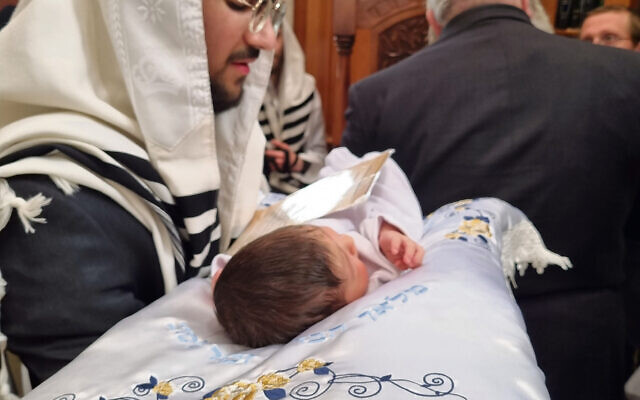Circumcision – is it justified
In coming weeks we will read much about this basic Jewish practice that dates back to the patriarch Abraham.
In Judaism male circumcision is a religious requirement, based on a Divine command: “This is My covenant which you shall keep; every male among you shall be circumcised, and you shall be circumcised in the flesh of your foreskin.” (Bereshit 17:10-11).
The ebb and flow of medical opinion is not the criterion by which Jewish parents decide whether to have their sons circumcised. The argument that weighs with them is that it is a mark of dedication to the service of God and a sign of belonging to the Jewish people. It also stresses the sanctity of the most intimate aspects of personal and family life.
The circumcision (“brit milah”) is carried out on the eighth day after birth, or later if medical reasons make a postponement advisable. It takes place among family and friends, symbolising the community’s welcome to the newborn child.
Prayers and benedictions are recited, a Hebrew name is bestowed on the child, and all present express the wish that he may progress from one sacred moment of his life to another.
In theory the father should circumcise his son, but the responsibility is usually delegated to a professional expert, a “mohel”. He must be a learned, pious Jew, with specialised training and experience. It is not religiously necessary for him to be a doctor, though some doctors act in this capacity. The training and skill of even a lay mohel are such that complications hardly ever arise.
The procedure is simple. The actual cut takes less than 10 seconds; those present usually remark that everything was over before they noticed it. A baby who is properly fed and not hungry generally stops crying almost at once. Since he is so easily pacified after circumcision, even though no anaesthetic or sedative was used, the procedure seems to entail hardly any pain. (With older children or adults, circumcision is done under anaesthesia.)
Elijah the prophet is present in spirit at every circumcision. He is there to express God’s pride in the loyalty Jews have always shown, sometimes in difficult circumstances, to this religious duty. These days Elijah must be impressed to witness the determination of Jews from the former Soviet Union who, arriving in Israel or western countries, arrange to be circumcised, sometimes as old men.
All this is done for religious and cultural reasons, irrespective of fluctuations in medical opinion. Yet clear medical benefits reinforce religious considerations.
In 1988 the California Medical Association endorsed a resolution calling circumcision “an effective public health measure”.
In 1990 Edgar J Schoen, of the American Academy of Paediatrics, stated in The New England Journal of Medicine: “The benefits of routine circumcision of newborns as a preventative health measure far exceed the risks of the procedure.”
We as Jews are pleased when we read such statements, but our age-old commitment to circumcision is, as has been noted above, based on different (we would say “higher”) considerations.
No matter how low their degree of observance of other Jewish practices, for millennia Jews maintained circumcision as the command of a wise Creator. Only very recently has it unfortunately been queried.
In his commentary on Bereshit 17:10, former British Chief Rabbi Joseph H Hertz wrote: “Circumcision is the abiding symbol of the consecration of the children of Abraham to the God of Abraham. As the sacred rite of the covenant, it is of fundamental importance for the religious existence of Israel.
“Unbounded has been the devotion with which it has been kept. Jewish men and women have in all ages been ready to lay down their lives in its observance.
“The Maccabean martyrs died for it. The officers of King Antiochus, the chronicler tells us, put to death the mothers who initiated their children into the covenant – and they hanged their babes about their necks. (I Maccabees 1: 61).
“We find the same readiness for self-immolation in its defence when the Roman emperor Hadrian aimed, by prohibiting it, at the destruction of Judaism; when in the dread days of the Inquisition, obedience to this command meant certain death; yea, whenever and wherever tyrants undertook to uproot the Jewish faith.
“So vitally significant has loyalty to this rite proved itself, that even an excommunicated semi-apostate like Baruch (Benedictus) Spinoza (1632-1677) declared: ‘Such great importance do I attach to the sign of the covenant, that I am persuaded it is sufficient by itself to maintain the separate existence of the nation forever.’”
Thank God this attitude has continued almost without exception to the current age.
OZTORAH.COM
Rabbi Raymond Apple was formerly senior minister of The Great Synagogue, Sydney.


comments